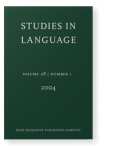Vol. 28:1 (2004) ► pp.105–136
Transitivity of ergative case-marking predicates in Japanese
In this article, I argue that ergative case-marking predicates in Japanese, which take two non-canonically case-marked arguments, are best described as transitive predicates having subjects and direct objects, rather than as intransitive predicates without any direct objects — contrary to Shibatani’s recent proposal (Shibatani 1999, 2001a, b, Shibatani and Pardeshi 2001). More specifically, ergative case-marking predicates are argued to be transitive, as originally conceived by Kuno (1973) and others, on the basis that outer dative/nominative phrases display subject properties, while inner nominative phrases exhibit positive object properties. Furthermore, it is argued that ergative case-marking constructions do not constitute a sub-type of double subject construction by showing that they are licensed in a different way.
Cited by
Cited by 8 other publications
This list is based on CrossRef data as of 16 june 2024. Please note that it may not be complete. Sources presented here have been supplied by the respective publishers. Any errors therein should be reported to them.
